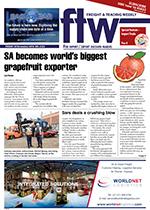Companies dealing with inbound freight agree that volumes are good and business is steadily surging but the import sector is also not cresting a wave of pure yield. Beset by challenges like operational costs and a volatile rand stalking rates of exchange (RE), one industry leader even went so far as to say that “generally speaking it’s murder out there”. Talking to FTW about the state of imports into South Africa, Margrit Wolff, managing director of Mercury Freight, said the forwarder was seeing strong incoming demand and “has a book that is packed to the limits”. And yet payment headaches and pesky variables have forced Mercury to remain nimble. “We’ve launched a new division that focuses on household removals, an area of freight that a lot of competitors shy away from because of the risks that come with personal carriage. “But we had a good look at growing interest in this line of freight and decided it’s an opportunity we simply couldn’t say no to.” As for delayed payment, Wolff believes escalating emigration has led to “absentee business owners” relying on second-rate managers to run their South African affairs for them. Lee Viljoen, ocean freight director at NVOCC CFR Freight, agreed with Wolff about imports. “It’s been a very tough year but we’ve seen great growth and there’s been constant effort on our side to improve services, drive diversification, and explore new markets,” she told FTW. She added that importers and exporters alike were constantly asking where they could cut costs resulting in “rates dominating conversation”. Additionally, industry pressures continue to encourage the likes of CFR to identify new routes and capacity such as the recent over-border consolidation service launched between the southern DRC and South Africa. “We’re exhausting all options, are always interested in generating new business, and believe that value additions are particularly relevant at this stage.” Speaking of overall market conditions, Viljoen said rand volatility was having a significant impact on margins as lag-time on freight, which could take several weeks to be cleared, invariably had an effect on remittances and other bottom line issues. Janie Pio, Ecu Worldwide’s sales executive in Port Elizabeth, echoed the concerns and challenges of her professional peers. She said the company was benefiting from a good volume flow with margins unfortunately eaten into by costs. “Smaller companies are on the hunt for better deals, more so than usual, forcing us to be as flexible as possible with our rates.” In a “cut-throat and competitive market” it’s not easy though, and as is the case with Mercury and CFR, Ecu Worldwide is giving with the one hand whilst searching to gain with the other. “We’re on a massive sales drive to grow business and are looking at piggybacking off existing lines to increase trade.” Taking a longer view of what lies ahead, Pio said Ecu Worldwide had identified the need for weekly sailings between South Africa, Germany, Singapore and Taiwan as a win-win strategy going into 2019 and beyond. Supporting the view that not all is peachy as the peak season approaches, economist Mike Schussler said the latest figures by Stats SA painted a picture of an industry bedevilling its own potential. He pointed out that payload figures on the road freight side were sitting at 10.2, 12.6, and 9.3% for the months of July, August and September. “These figures are up year-on-year, supporting the view that volume has increased, but the income figures for the same months aren’t looking great, sitting at 8, 9 and 6%. “What’s worse,” said Schussler, “is that those are nominal income figures. Add into this the price of diesel that has gone up 23.2% in recent times, and a wage rate of 8%, and the import sector is simply not looking as good as many thought it would.” He stressed though that the country appeared to be going through an adjustment phase. “The economy is a little schizophrenic at the moment and a lot of companies are sitting tight to see what next year brings.”
CAPTION
We’ve launched a new division that focuses on household removals, an area that a lot of competitors shy away from. – Margrit Wolff

